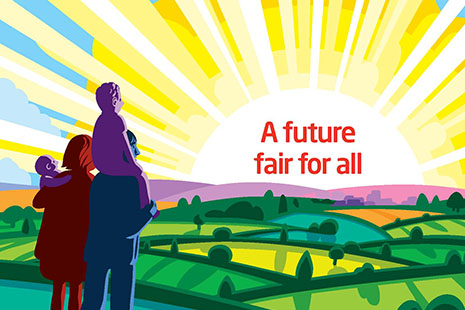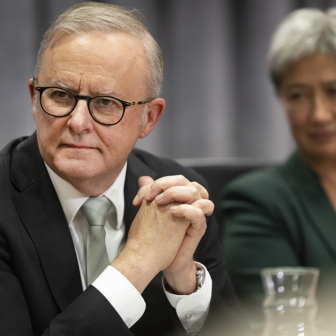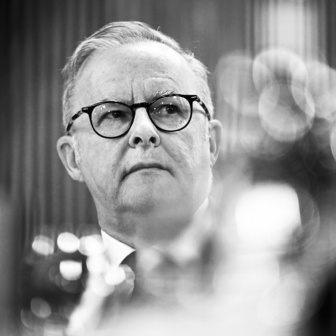THERE’S A BUSINESS in the north London suburb where I live that displays a small blackboard containing a roughly chalked message: “Nothing Is Permenant But Woe.” Leaving aside the shaky spelling, that seems an astute description of the attitude of many British electors to the 6 May general election.
The first week of the campaign, which most commentators and at least one opinion poll awarded to David Cameron and the Conservative Party, had a distinct air of unreality about it. Much of the media coverage seemed primarily concerned with the three leaders’ wives, and those issues that did attract coverage appeared somewhat peripheral to how Britain was likely to be governed for the next five years.
The Tories, for example, promised a tax break for about four million married couples – a whopping £3 a week – as part of an effort to repair “Broken Britain.” They also pledged to reverse Labour’s plans for an increase in national insurance payments, which they say they’ll fund from “efficiency savings,” and engineered a letter signed by over 100 leading businessmen condemning the Labour plan for its alleged impact on jobs. Naturally, there are no bankers among the signatories – their support would be about as welcome these days as endorsement by paedophiles – but the Liberal Democrats treasury spokesman, Vince Cable, was still moved to describe this effort by filthy rich businessmen to lecture the rest of the country on how to run its affairs as “utterly nauseating.” Cable, formerly Shell’s chief economist, is the public’s preferred chancellor in opinion polling on the subject, a point that provides a fair indication of how well the two major parties are travelling in public esteem as economic managers.
And then there was David Cameron, accompanied by Sir Michael Caine, spruiking the virtues of a few weeks of voluntary national service for teenagers. Sir Michael, by the way, thought Dave would make a fine PM: “I think he’d be great, I really do. I hope they will put my tax down that the socialists just put up.” Meanwhile, we had Gordon Brown standing shoulder-to-shoulder with the mother of a murder victim while berating the Tories for wanting to curb the use of DNA databases on people never convicted of a crime.
In some respects, Sir Michael got closer to the heart of the matter than either Brown or Cameron has so far managed. One reason for that, of course, is that he’s not offering himself for election. None dare call it conspiracy, but the parties have learned from the expenses scandal that truly awful things can happen when the gales of public opinion, whipped up by a media frenzy, get well and truly beyond the control of Westminster and Whitehall’s vast army of spin doctors.
It’s what the two major party leaders are not saying that tells the real story of this election campaign so far. They’re not debating Britain’s massive public debt, and they’re not debating which services will need to be cut in order to deal with it. They’re trying to maintain the fantasy that serious inroads can be made into that debt without affecting the services that people value. They’re not discussing whether Britain will once again tie its future to a financial sector whose reckless behaviour brought the country to its knees. They’ve hardly said a word about Britain’s relationship with Europe. And when you have both major party leaders – the prime minister and the man who regards himself as the prime minister-in-waiting – avoiding a television interview with the admittedly aggressive Jeremy Paxman, presumably on the grounds that he might ask them some tough questions, you have a fairly vivid illustration of what a sparkling affair the general election of 2010 has been so far.
By the middle of this week both parties had released their manifestos but the campaign hardly seems more real as a result. The Tories are pledging to give power back to the people, encourage volunteering and allow local communities to start their own schools and sack under-performing police chiefs and politicians. And although the Tory Manifesto is a 118-page hardback compared with its miserable twenty-seven in 2005, there’s apparently little there that has not already been foreshadowed in previous Cameron speeches calling for less bureaucracy and a warm and fuzzy sense of community (a “Big Society,” no less).
Meanwhile, the boldest stroke in Labour’s similarly unassuming effort was an extraordinary retro rising sun of the socialist-realist variety on the cover, which contrasted with the Tories’ plain blue. Labour has pledged to increase the minimum wage and to pick up aspects of the Blairite agenda of public service reform – exactly the kind of agenda Brown frequently opposed as chancellor. The government’s also talking about holding a referendum on an elected House of Lords and Australian-style preferential voting. These reforms bring to mind the policies the freshly minted New Labour advocated back in 1997 and then failed to implement, but perhaps it’s thought that if you look serious about democratic renewal it might help electors forget about the infamous expenses scandal.
Such amnesia is unlikely. The keynote of this election campaign so far has been the widespread conviction that neither of the major parties is worthy of support; the expenses scandal has contributed mightily to this erosion of trust. There’s also a widespread feeling that politicians routinely lie and that – along with greedy bankers and overpaid public servants – they form a socially remote and self-serving elite. In a country where voting is optional, this is a dangerous brew for all of the parties, especially the two big ones, and is lending an intriguing note of uncertainty to the election result. The latest poll suggests that just 55 per cent of electors intend turning out on 6 May.
The polls still point to a hung parliament, with the Liberal Democrats under its leader, Nick Clegg, holding the balance of power. Most voters expect that Cameron will emerge from the election as prime minister but there’s precious little enthusiasm for this prospect. Opinion polling generally places the Tories about seven or eight points ahead of the government, whose support has hovered around 30 per cent. But the Conservatives have generally been unable to break the 40 per cent barrier seen as critical if they are to have any chance of governing in their own right. The Liberal Democrats, meanwhile, are attracting about 20 per cent support and seem very likely to benefit from disillusionment with Labour and the Tories. And with a photogenic and articulate young leader in Clegg, they are likely to gain from the televised leaders’ debates, which will give him unprecedented media exposure.
For the first time in Britain, this election will feature such debates – three, in fact. In Australia, where we are used to such things, leaders’ debates are likely to produce a big yawn and probably lose out in the ratings to Australian Idol. But here, their novelty value has led to expectations of enormous television audiences and the chance that leaders’ performances will exercise a major influence, for better or worse, on voter opinion. That, too, is fostering uncertainty, and a sense that a single slip-up on the part of Brown or Cameron could spell disaster for their side. Will Brown appear wooden, Cameron green?
There’s certainly no sign of a wave of popularity on which David Cameron and the Tories will ride to office; nor, despite the unpopularity of Brown and Labour, is there a wave of revulsion that seems to demand the ejection of a long-serving government from office. There’s a kind of brooding anger, but much of it is routinely deflected onto other targets, such as greedy bankers, highly paid civil service chiefs and, more ominously, immigrants competing for scarce jobs. I’d be inclined to compare the public mood here with the mood in Australia just before the 1996 election, except that the polls don’t point to a big Conservative victory or even, at this stage, a workable majority.
THE TORIES’ problem begins with its leadership. Cameron – who, like Clegg, is a youthful forty-three – essentially crafted himself as a Tory Tony Blair who would help his party capture the political middle ground by making a definite break from the most unseemly and divisive aspects of its Thatcherite past. This approach probably made a great deal of sense earlier in the decade, when young and ambitious politicians of all stripes were in awe of Blair’s popularity, electoral success and political salesmanship. And there is no doubt that Cameron and the Tories have recaptured many voters, especially in the southeast, who were once attracted to Blair. But Cameron’s approach is a more fraught business these days because Blairism as a political style went out of fashion with the war in Iraq, and also because “events” – as Harold Macmillan called them – have intervened to raise some hard questions about who is best suited to guide the British economy through its most difficult challenges since perhaps the 1930s. There are probably just enough voters willing to accept that Cameron will be a competent prime minister to get him into the job but they’ll put him there more in hope than with confidence or enthusiasm.
Cameron has also, for the time being at least, seen off some dangers from his own right wing. The Tories have had to contend with the accusation that their leader’s smiling face is just a front for a nasty party that never went away. Their alliances with creepy right-wing parties on the continent; the grumbling of climate-change sceptics and Europhobes; the occasional outburst against gays (unhelpfully, most recently, from the shadow home secretary); even the odd eruption of class-snobbery from some fox-and-hound-type candidate in the shires – these are the matters with which your average “hip” and “progressive” cycle-riding Tory leader must contend in 2010. Still, all the signs suggest that Cameron has managed to keep these kinds of threats more or less under control, at least this side of the election.
The recovery of Labour in the polls since early this year seems to have much to do with fears, especially among public sector workers, that the Conservatives would make Thatcher-like cuts in government spending that would cost them their jobs. While these worries remain, there is also a widespread resignation to the fact that, regardless of who makes it into office next month, tough times are ahead. When Labour chancellor Alistair Darling delivered his pre-election budget, he admitted as much, foreshadowing cuts more severe than under Thatcher. In the post–global financial crisis era, governments may come and go but woe is permanent; and Labour has so far failed to convince enough voters that a change of government would produce more disastrous results than another five years of Brown and Labour. And in so failing, it has built on a woeful record of political communication since about September 2007 – when the new prime minister contemplated and then (when the polls quickly turned against him) abandoned the idea of an early election.
Meanwhile, three interlocking crises – Iraq, the global financial meltdown and the political expenses scandal – while inevitably damaging to the entire political class, have combined to finish off the New Labour project. Political commentators now treat New Labour as a phenomenon with a beginning, middle and end; it’s now history. Yet if that’s Labour’s problem, it’s also one ironically shared by Cameron and the Tories – because they ultimately decided to buy a stake in the same project at the very moment it began falling apart.
For that reason if no other, a hung parliament in which two, three or more parties found themselves having to work together in unfamiliar ways would perhaps be a peculiarly apt end to the era. •




